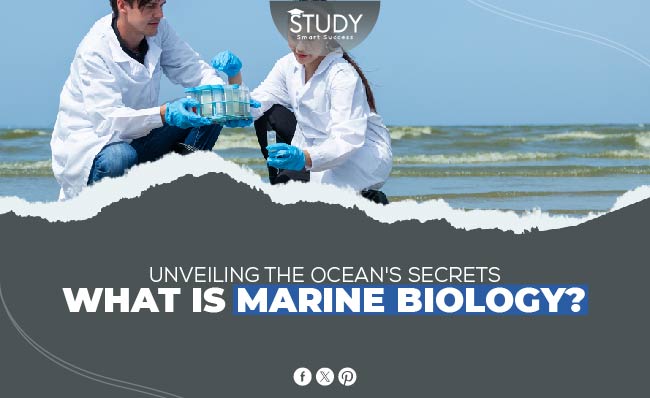The ocean has life and mysteries that have attracted humans for millennia. The study of marine biology provides a fascinating look at the undersea environment for eco- or science-lovers. This blog article explains marine biology, its importance, and its amazing discoveries, helping you grasp the enormous blue globe.
Introduction
Marine biology is the scientific study of living things in the ocean and other salty places. Marine scientists study all living things in the water, from the smallest plankton to the largest whales. Understanding marine biology is essential to protecting aquatic environments and keeping our world healthy.
The Importance of Marine Biology
The oceans cover more than 70% of the Earth’s area and are home to various living things. Marine biology helps us understand how ocean ecosystems work and how our actions affect them. Scientists can devise ways to protect rare species and essential environments by studying sea life.
History of Marine Biology
Early societies, like the Greeks and Romans, were interested in and studied sea life. However, marine biology did not become an official field of science until the 19th century. Pioneers like Charles Darwin and Louis Agassiz made significant efforts that set the stage for future study.
Various Branches of Marine Biology
It has many subfields, and each one studies a different part of aquatic life. Here are some essential branches:
- Marine Ecology: Studies the interactions between marine organisms and their environment.
- Ichthyology: Focuses on fish biology and their behaviour.
- Marine Microbiology: Investigates microscopic organisms, including bacteria and viruses.
- Marine Mammalogy: Examines marine mammals like whales, dolphins, and seals.
Marine Ecosystems
Coral reefs, deep-sea vents, rivers, and mangroves are all marine environments. Different ecosystems are home to other groups of animals that have adapted to live in those ecosystems. For example, coral reefs are places with many various kinds of plants and animals. Deep-sea vents are home to animals that can survive in harsh circumstances.
Fascinating Marine Life
Some of the strangest animals in the world live in the ocean. Life has evolved amazingly, from bioluminescent jellyfish to giant squid. Scientists study these creatures to learn about their nature, how they act, and their role in the ecosystem.
Marine Conservation Efforts
Protecting the oceans is an integral part of marine biology. Marine environments are in danger because of pollution, overfishing, and climate change. Marine scientists work on protection projects to keep species from going extinct, fix up environments, and encourage fishermen to fish in a way that doesn’t harm the environment.
The Role of Technology in Marine Biology
Technological advancements have transformed marine biology. Thanks to remote sensing, underwater drones, and DNA analysis, scientists can study the ocean in ways that have never been done before. These tools help scientists collect information, monitor marine life, and find new species.
Marine Biology Careers
Opportunities abound in marine biology, from studying in the field to working in museums and protection groups. Marine scientists may also help make policies, teach, and advocate for the environment to help protect aquatic life worldwide.
Challenges in Marine Biology
Marine scientists face many problems, such as not having enough money, working under challenging conditions, and the complexity of aquatic ecosystems. Despite these problems, their work is driven by a strong desire to understand and protect the ocean, which leads to ground-breaking findings.
The Future of Marine Biology
With ongoing studies revealing new insights into marine life, the future of marine biology is auspicious. New threats like ocean acidification and plastic waste will require new approaches and cooperation between countries.
How to Get Involved in Marine Biology
If you love the water and marine biology, there are several ways to get involved. A degree or one in oceanography, environmental science, or biology might be helpful. Specialized studies and fieldwork are available at several institutions. Conservation group volunteering and citizen science programs may also give hands-on experience and aid research and conservation.
Interesting Marine Biology Projects
Many marine biology projects are pioneering. Broken corals are reattached and regenerated to restore coral reefs. Marine bioluminescence, which studies sea light-producing creatures, is also intriguing. Satellite tags also monitor and preserve migratory animals like sea turtles and whales.
Prominent Marine Biologists
Marine biology has been greatly influenced by various personalities throughout history. Researcher Rachel Carson raised awareness of pesticides’ effects on aquatic environments. The famous oceanographer Sylvia Earle, nicknamed “Her Deepness,” promotes ocean conservation. Modern marine scientists like David Attenborough inspire and educate the public via films and writings.
Myths and Misconceptions
Like many scientific subjects, marine biology has myths and misunderstandings. Sharks are crucial to aquatic ecosystems and are in danger from human activity despite the notion that they are mindless predators. The deep ocean contains unusual living forms adapted to severe circumstances, dispelling the myth that it is dead. Marine scientists dispel these misconceptions to increase marine awareness.
Marine Biology in Popular Culture
Popular culture has always been fascinated by marine biology. Movies like “Finding Nemo” and documentaries like “Blue Planet” have popularized aquatic secrets. Often, exaggerated cultural portrayals enhance awareness of marine life and ocean protection. Public engagement via media may inspire future marine scientists and ocean champions.
Global Collaboration in Marine Research
Because oceanic ecosystems are transboundary, marine biology necessitates international collaboration. Large-scale research efforts by international scientists address global concerns, including marine pollution and climate change. The International Union for Conservation of Nature (IUCN) and the UNEP facilitate this cooperation to conserve and preserve marine resources.
Conclusion
Marine biology shows us the amazing things in the ocean and the complex web of life that keeps our world going. By learning and protecting marine areas, we can ensure that future generations will have a healthy ocean. For those who want to know more, you could look into marine biology further and join a group of passionate ocean supporters.


